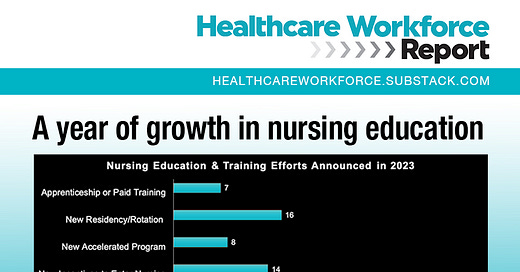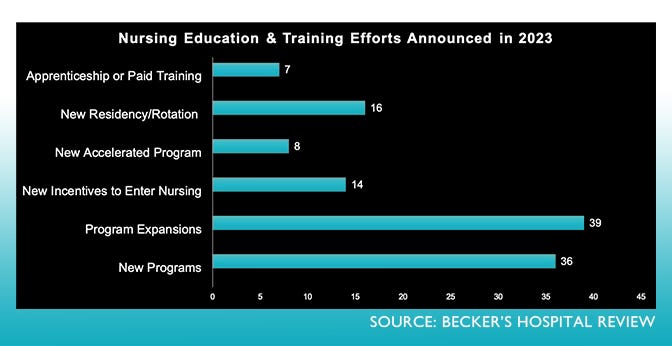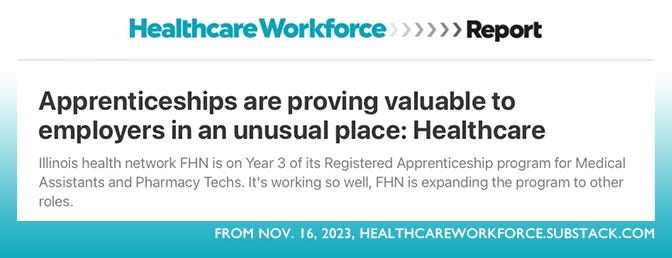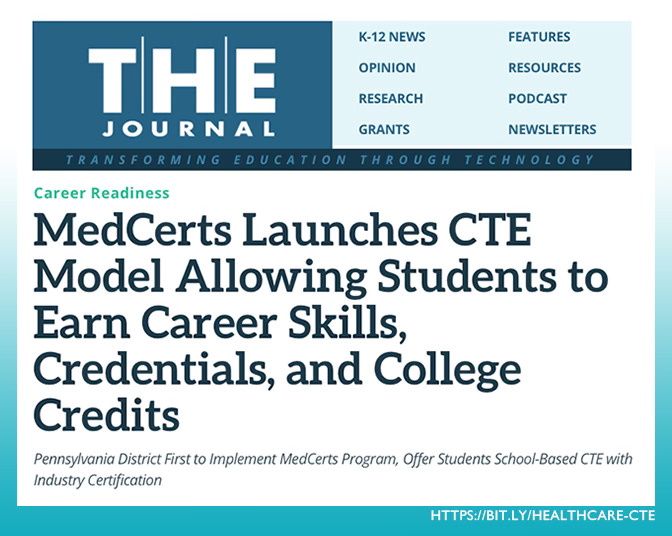A year of growth in nursing education: Over 100 new programs or expansions in 2023
Plus: HC still leading the economy on job gains; More high schools report growing demand for healthcare CTE programs
First, the numbers:
Almost every month this year, job growth in the healthcare sector has led all sectors, according to the Bureau of Labor Statistics, and November was a blockbuster month for new healthcare jobs — and this is despite a sizable drop in the number of job openings the month before.
The latest report from BLS shows healthcare added 77K jobs in November, a whopping 43% higher than the average monthly gains over the past year. The month prior, the number of job openings in the U.S. healthcare sector had fallen slightly to 1.5M, BLS said.
Becker’s Hospital Review says the numbers show higher labor force participation, wage gains, and a healthcare labor “comeback.” Read the Becker’s report here.
A year of growth in nursing education programs
During 2023, more than 100 healthcare organizations, academic institutions, and workforce agencies focused on training more nurses announced new education and training programs, new accelerated programs, significant expansions, new residencies, or new incentives to enter the field.
A list published by Becker’s includes scores of examples that indicates some trends:
Individual programs receiving grants to expand nursing program seats
Brand new nurse education programs that opened this year or will open in 2024
Statewide programs to entice more people into healthcare careers
New nurse-midwifery education programs (University of Minnesota - Minneapolis and University of Iowa)
More 12-month accelerated nursing programs
Below is a look at the totals for each type of nursing program news included in Becker’s list. Note: Newly announced accelerated nursing education programs were included in both the “accelerated program” total and “new program” total, and incentives could include free tuition, a cash payment for newly graduated nurses in exchange for a three-year work commitment, or anything in between.
Some noteworthy examples from the list:
The state of Delaware implemented a tuition incentive program for certified nurse assistants on Dec. 1.
Maryland is giving its nine nursing schools almost $6M to expand their programs.
University of New England (Maine) is launching a 12-month accelerated bachelor of science in nursing degree program.
Catholic Health (Buffalo, N.Y.) created a residency program to increase the number of nurses.
Northern Virginia Community College's licensed practical nurse program added 80 spots.
Massachusetts’ state scholarship fund will cover 100% of tuition for nursing students and pre-nursing students enrolled in the state’s community colleges this year.
Oklahoma City University is launching a 12-month accelerated nursing program.
UConn School of Nursing is launching an accelerated bachelor’s of nursing program.
Also announced in 2023 were a variety of iterations on the hire-and-train model, which provides those studying for a nursing credential a paying job while they’re in the program.
Perhaps the most radical version of this is at UW Health in Madison, Wisconsin, which “has developed one of the nation's first registered nurse apprenticeship programs to expand Wisconsin's pipeline of future nurses,” Becker’s reported.
FWIW: The word 'radical’ is used here from an industry norm perspective; I don’t see it as all that radical, and the industry’s innovators don’t either — but for healthcare as a whole, apprenticeships for RNs are, unfortunately, unusual. The Nov. 16 edition of Healthcare Workforce Report features a health network in Illinois that’s established a thriving apprenticeship program for several healthcare positions; FHN is expanding its apprenticeships into higher-skilled roles, too. For evidence on how well apprenticeships work in healthcare, check out the Nov. 28 edition of HWR.
“The system is partnering with the Wisconsin Department of Workforce Development and Madison College on the four-year program,” said the Becker’s article. “Through the apprenticeship, students will complete two years of prerequisite coursework and two years of core nursing courses overseen by Madison College's faculty to receive their associate's degree. Students will also work as nursing assistants at UW Health for the first two years of the program and as student nurses for the second two years. After graduation, nurses will join the health system in a nursing role, pending the results of their licensing exam.”
UW Health said it will also offer “financial support for tuition, books and supplies, and full-time salary and benefits for apprentices,” Becker’s reported.
More high schools announcing CTE programs with certifications for healthcare careers
I’ve written in HWR and in THEJournal.com about the push to add more healthcare career and technical education programs to high school curriculum options across the country. Thanks to cookies, I no longer have to search for new similar announcements (LOL).
A sampling of relevant headlines from just the past seven days (!!), courtesy of Google news and my browser cookies:
Charles County Public Schools in Maryland is expanding its two-year CTE program to add medical coding and pharmacy tech pathways, culminating in industry-recognized certifications before students graduate high school.
Hamlin School District in South Dakota is finishing construction on a new CTE facility that will offer healthcare programs, among others, for high-schoolers in three districts.
Mandan Public Schools in Bismarck, North Dakota, is building a new $20 million CTE Center at the new Mandan High School, serving students from 10 area high schools and offering dual-credit courses alongside industry certifications for career jobs in healthcare, agriculture, culinary, and skilled trades.
Administrators for Prosper and Celina Independent School Districts in Texas report that CTE enrollment has more than doubled since 2019 and healthcare CTE programs are growing even faster; the districts’ healthcare CTE pathways equip students with clinical workforce experience and industry certifications for high-demand jobs in hospitals and emergency medicine including Certified EKG Technician as well as Certified Nursing Assistant and Patient Care Technician — and administrators said they’re working to add more programs with industry-recognized certifications for healthcare careers.
Shout-out to Healthcare Workforce Report sponsors
The Healthcare Workforce Report newsletter is generously supported by MedCerts.
For information on supporting HWR, email HealthcareWorkforce@substack.com.








